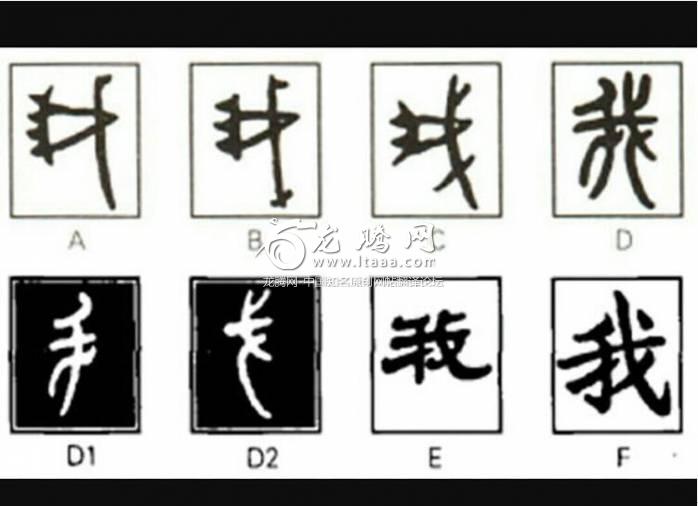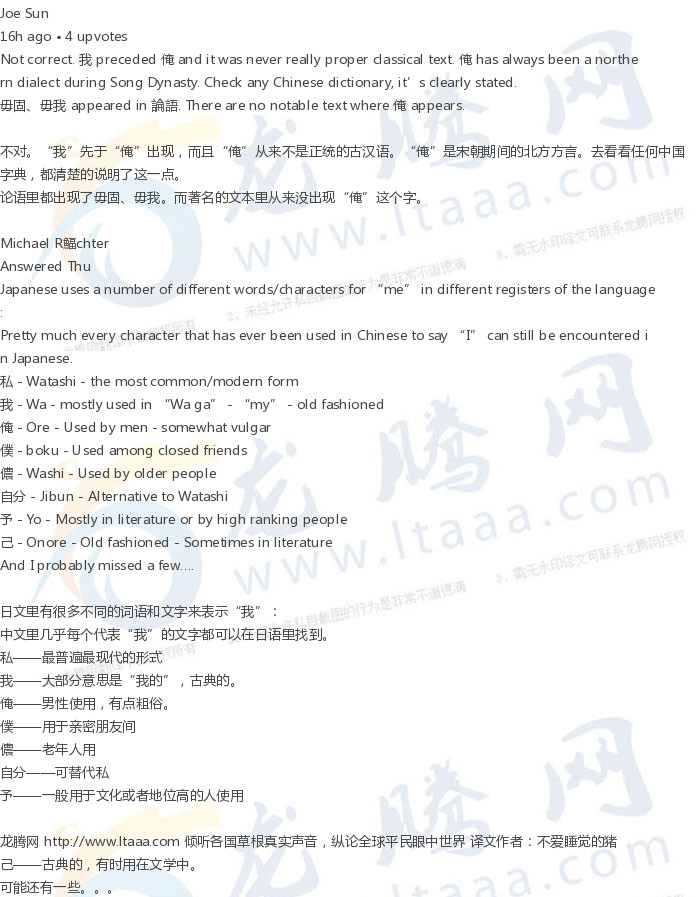为什么古代日语选择了中文“俺”而不是“我”来表示自己呢? [美国媒体]
quora网友:我不同意Paul Denlinger的看法。“我”并不是现代词汇,在20世纪,也不是一个人称呼自己的代词。“我”首次出现在商朝甲骨文里(公元前1600到1046年)。A是“我”的原始形式,F是其现代写法......
Why did the ancient Japanese pick the Chinese word "俺" instead of the Chinese word "我" for a person call itself?
为什么古代日语选择了中文“俺”而不是“我”来表示自己呢?
Jamie Wang, studied at Glion Institute of Higher Education (2010)
Answered 22h ago
I have to disagree with Paul Denlinger. “我” is not a modern word, nor being the pronoun for oneself in 20th century.
“我” first appeared in Chinese bone script in Shang dynasty (1600-1046BC).
A is the original format of “我”, and F is its modern look.
Its original meaning was a execution weapon much like an axe. Later on it became “shouting with weapon in hands”.
During the warring states period (475–221BC), the meaning of it was replaced by more advanced weapons.
While in the period from Han to Tang dynasty (202BC-907AD), 我 became the first person pronoun till now.
Japan used to have no writing system, until Japanese student brought Chinese characters back after studying in China. They used characters to represent the pronunciations. Much like how Japanese words appears in English content, like さくら/Sakura which means cherry blossom.
But for simply meaning words, I guess Japanese just took the Chinese character by its meaning, such as 俺.
Then why 俺 but not any other characters from the 100 ways of how Chinese call ourselves? I think it’s because of the geopolitical distance.
The most likely route for ancient Japanese to come to China is from the north, possibly going through Korea peninsula. This may explains why Japan in history invaded Korea many times. It’s the closest piece of the continent.
俺 in Chinese is a common first person pronoun in northern dialect. And because it’s totally not delicate, therefore used mostly by males.
As Michael Röschter stated, 俺 in Japanese is also for men. We can find a lot of examples in Japanese movies and TV dramas when someone use the pronoun from the opposite sex after a soul exchange. Most likely scene is when a girl says 俺 then switch to 私.
I don’t think this is a coincidence.
P.S.: I am no language expert and made many mistakes when started posting on Quora. I simply searched online for necessary evident, and combine them together to get a whole picture. If you sense any mistake, please let me know where and how.
我不同意Paul Denlinger的看法。“我”并不是现代词汇,在20世纪,也不是一个人称呼自己的代词。
“我”首次出现在商朝甲骨文里(公元前1600到1046年)。A是“我”的原始形式,F是其现代写法。
其原始含义是指一个处决武器的意思,比如斧头。后来意思变成“手持武器大喊大叫”。
战国期间(公元前475到221年),其意思被更先进的武器替代了。
从汉朝到唐朝时期(公元前202到公元907),“我”成为了首个人称代词,直到今天。
日本以前没有书写系统,来中国留学的日本学生将汉字带回日本。以前他们用文字来表达发音。好比日本单词在英语内容下的展示,比如さくら/Sakura指的就是樱花。
Paul Guo
13h ago • 1 upvote
The problem is that 俺 originally meant “you” in Japanese before it became “I” later.
问题是“俺”在日语里原先是“你”的意思,后来才变成“我”的意思。
Paul Denlinger, Have lived in China, Taiwan and Hong Kong; fluent in Mandarin (written, spoken)
Answered Wed
Because 俺 is the classical Chinese word, and 我 is the modern Chinese version which only came into widespread usage in the 1920s.
因为“俺”是古汉语,而“我”是现代汉语,到了1920年代才普遍使用。
Sun Jades
Thu
Japanese use old classical Chinese from Tang or Song dynasty. Language changes with time inside China. Japan is not inside China and thus keep classical Chinese.
日本使用唐宋期间的古汉语。在中国境内,语言随着时间发生了变化。日本不在中国之内,所以保留了古汉语。
版权声明
我们致力于传递世界各地老百姓最真实、最直接、最详尽的对中国的看法
【版权与免责声明】如发现内容存在版权问题,烦请提供相关信息发邮件,
我们将及时沟通与处理。本站内容除非来源注明五毛网,否则均为网友转载,涉及言论、版权与本站无关。
本文仅代表作者观点,不代表本站立场。
本文来自网络,如有侵权及时联系本网站。
图文文章RECOMMEND
热门文章HOT NEWS
-
1
Why do most people who have a positive view of China have been to ...
- 2
- 3
- 4
- 5
- 6
- 7
- 8
- 9
- 10
推荐文章HOT NEWS
-
1
Why do most people who have a positive view of China have been to ...
- 2
- 3
- 4
- 5
- 6
- 7
- 8
- 9
- 10













